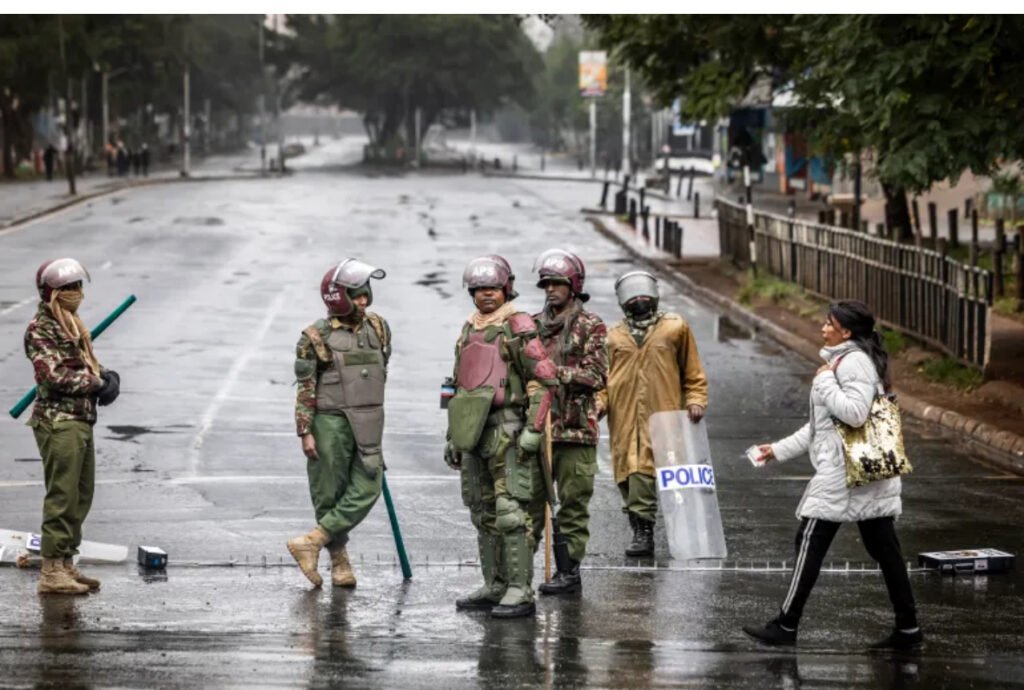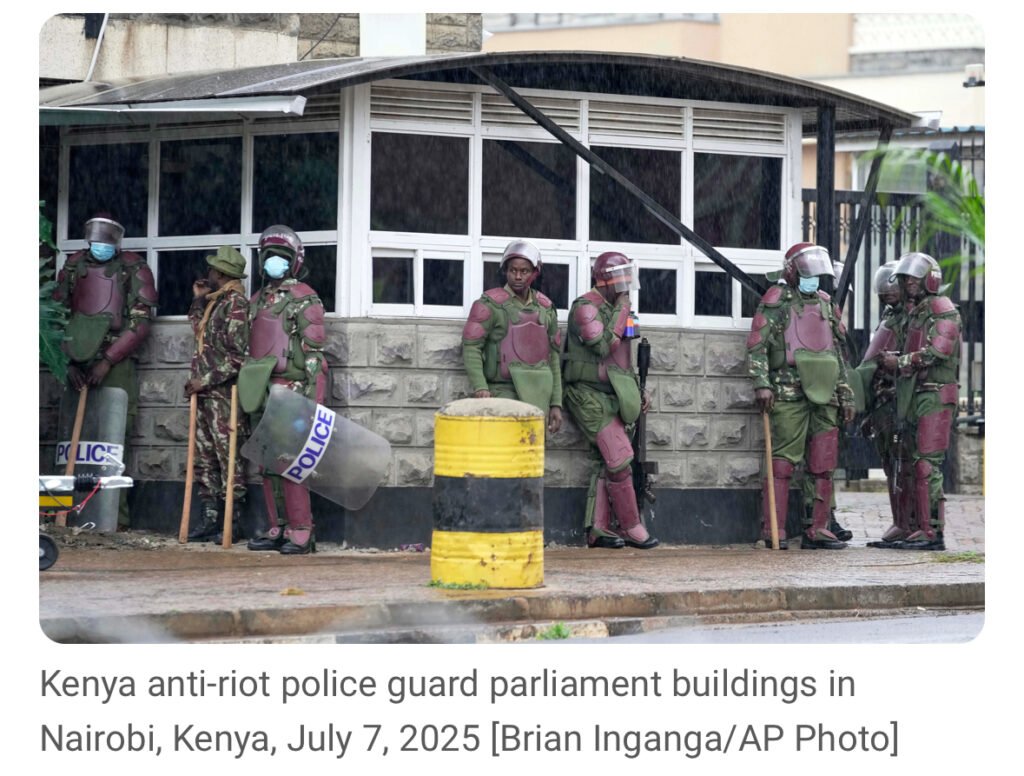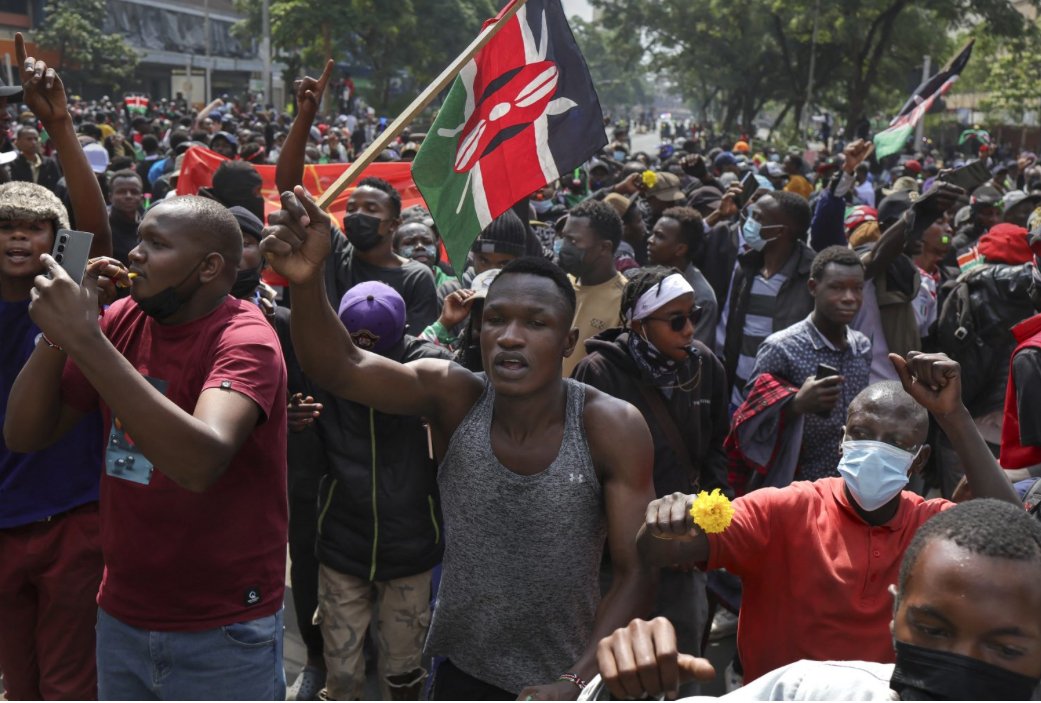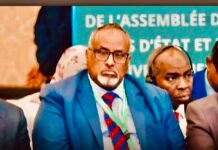
Tuesday, July 8, 2025
By Horn Africa News Staff | Nairobi
NAIROBI – At least eleven people were killed and dozens more injured across Kenya as police opened fire on demonstrators during nationwide anti-government protests on Monday, marking the 35th anniversary of Kenya’s pro-democracy uprising known as Saba Saba.

In a statement released Monday evening, Kenyan police confirmed that 52 officers were also injured during violent confrontations that erupted in the capital Nairobi and several other towns. The protests were sparked by growing frustration over the government’s economic policies, corruption, police brutality, and what many young Kenyans see as increasing authoritarianism.
Security forces fired live ammunition, tear gas, and deployed water cannon to disperse demonstrators, many of whom had taken to the streets chanting slogans, blowing whistles, and demanding President William Ruto’s resignation.
“We started receiving reports from several locations of people with gunshot wounds,” said Malcolm Webb, reporting for Al Jazeera from Nairobi. “Ambulances rushed to assist the injured as clashes erupted across multiple roads and towns.”
A Historic Date Becomes a Symbol of Resistance
July 7, or Saba Saba (meaning “Seven Seven” in Kiswahili), marks the 1990 protests that catalyzed Kenya’s return to multiparty democracy after decades of one-party rule under President Daniel arap Moi. While it is usually commemorated peacefully, this year’s protests morphed into a nationwide outcry against the Ruto government.
Hundreds of young Kenyans led the charge in a rapidly growing protest movement that many say is leaderless, grassroots, and digitally organized. Demonstrations were especially intense in Nairobi, Kisumu, Mombasa, and Eldoret, where businesses remained shuttered and schools were closed in anticipation of unrest.
Mounting Anger and Allegations
Protesters accused the government of hiring armed goons to disrupt peaceful rallies and provoke chaos to delegitimize the demonstrations. The government, however, labeled the protests as an “attempted coup”, vowing to crack down on any threats to public order.
“Our security agencies are on high alert to deal decisively with criminals and other elements of ill intent who may seek to infiltrate peaceful processions to cause havoc,” said Interior Minister Kipchumba Murkomen on his X (formerly Twitter) account.
On Sunday, a press conference organized by the Kenyan Human Rights Commission was violently interrupted by unidentified men wielding sticks, underscoring the volatile atmosphere surrounding civic activism.
“Total shutdown and forced holiday executed by the state,” wrote Hanifa Aden, a leading activist, on X. “The police getting rained on as they block every road while we stay at home warming our beds.”
Death of Blogger Sparks Wider Movement
Public outrage has intensified following the June death of Albert Ojwang, a popular teacher and blogger who died in police custody under suspicious circumstances. His death has become a rallying point for demonstrators, with the Kenya National Commission on Human Rights reporting 19 deaths in protests last month alone.
Prosecutors have since brought murder charges against six individuals, including three police officers, in connection to Ojwang’s death. All suspects have pleaded not guilty.
According to human rights watchdogs, at least 80 people have died and dozens more have been illegally detained in connection with demonstrations since June 2024.
Ruto’s Government Under Fire, But Remains Politically Secure
Despite mounting public pressure, President William Ruto, elected in 2022 on promises of economic reform, remains politically secure. His alliance with opposition figure Raila Odinga has consolidated power and left the protest movement without a unified political leadership ahead of the 2027 elections.
However, the unrest reveals deeper fissures in Kenyan society. Social media has amplified public discontent, especially among the youth, 80% of whom work in the informal sector under low-wage conditions. Many protesters say they feel betrayed by a system that has failed to deliver economic justice or democratic accountability.
“We are not ready to go back [home] because who will fight for our rights then? We will be here till evening,” said Francis Waswa, a construction worker who joined the protests in Nairobi.
As Kenya reels from the bloodshed, the international community and local human rights groups are calling for accountability, restraint, and a renewed commitment to protecting civil liberties and democratic freedoms in East Africa’s most developed economy.
SOURCE: Al Jazeera, Reuters, Kenya Human Rights Commission, Horn Africa News Staff.




